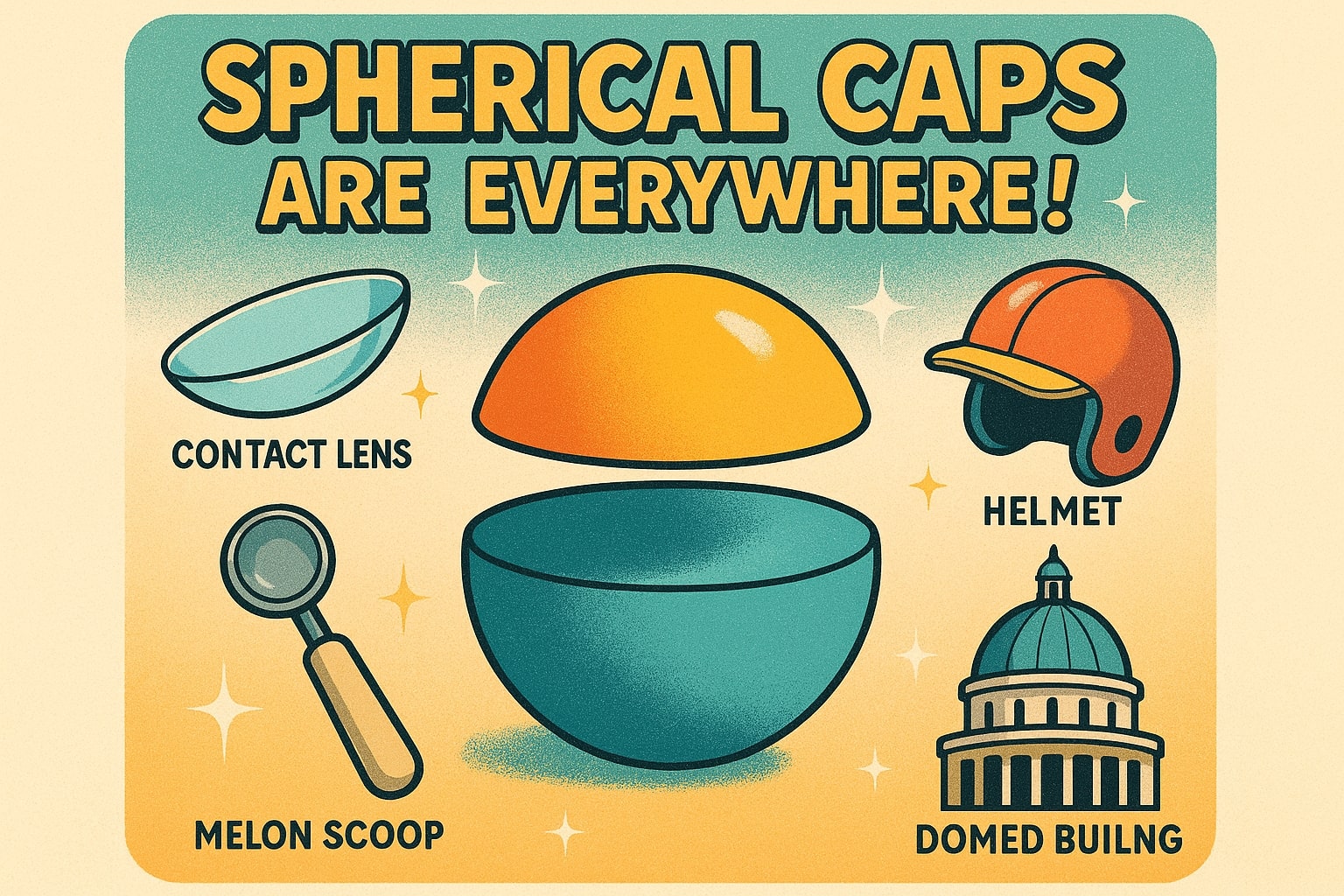Ever stared at the smooth dome of a building or the rounded top of a helmet and wondered what shape that is, exactly? You were probably looking at a spherical cap—a shape that shows up far more often than you might think. Though the term may sound like it belongs in a geometry textbook, spherical caps are part of your everyday world. From architecture and sports equipment to human anatomy and astronomy, this curved form plays a quiet but essential role in how we design, see, and understand the world.
For other shapes like cones, ellipsoids, or rectangular prisms, head over to the Volume Calculator for a full set of tools.
What Is a Spherical Cap?
At first glance, the term spherical cap might sound a bit technical—but chances are, you’ve seen one today without even realizing it. A spherical cap is simply the portion of a sphere that’s been sliced off by a flat plane. Imagine taking a perfectly round ball and slicing the top off with a knife. That curved piece you’ve removed? That’s your spherical cap.

To make it even more relatable: Think of the top of a dome, the surface of a contact lens, or the curved crown of a helmet. All of these are real-life examples of spherical caps. Even the rounded edge of a bowl or the top half of a scooped melon fits the description.
How to Calculate the Volume of a Spherical Cap?
Let’s break it down: a spherical cap is just a part of a sphere that’s been sliced by a flat surface. Picture a ball with the top cleanly cut off—that rounded top piece you’re left with is the spherical cap.
Need a real-world image? Think of:
-
The curved top of a building dome
-
The surface of a contact lens
-
The rounded crown of a helmet
-
The top scoop of a melon or even the edge of a bowl
These are all real-life versions of a spherical cap—simple, elegant, and everywher
How Do You Find the Volume of a Spherical Cap?
Once you recognize a spherical cap, the next step is figuring out how to measure it. The good news? There's one formula you’ll need:
V = (1/3) × π × h² × (3R − h)
Where:
-
Vis the volume of the spherical cap -
his the height of the cap (from the flat base to the curved top) -
Ris the radius of the original sphere
This formula comes from integrating a segment of the sphere in three dimensions—but you don’t need to dive into calculus to use it. You just plug in your values for h and R, and let the math do its thing.
🔍 Tip: Be sure to use the height of the cap, not the full diameter or sphere height. And if you'd rather skip the math, our Sphere Volume Calculator can do it all in seconds—perfect for students, professionals, or anyone needing fast results.
Ancient Uses of Spherical Geometry
The geometry behind spherical caps isn’t a modern invention—it’s been used for centuries. Ancient Greek thinkers like Hipparchus used spherical models to map the stars and planets. Later, scholars during the Islamic Golden Age, such as Alhazen, explored how light bent through curved surfaces, using sections of spheres to model optics.

Even in architecture, this shape plays a central role. Famed architect Antoni Gaudí used spherical cap designs in the magnificent domes of the Sagrada Família, combining beauty with structural efficiency.
From astronomy to engineering, this curved slice of geometry continues to influence how we build, explore, and understand the world.
Fun Facts About Spherical Caps
- Your cornea is a spherical cap. That curved outer surface of your eye helps focus incoming light. That’s why contact lenses and LASIK surgery must match your exact corneal curvature.
- The Moon’s craters often follow this shape. In planetary science, scientists model many craters as spherical caps to estimate depth and volume and to study impact patterns.
- You’ll find them in sports gear too. The curved end of a football, the top of a basketball, or even the round crown of some helmets all use this shape for symmetry and aerodynamics.
- So while a spherical cap might sound like a geometry concept best left in school, it’s actually a familiar, functional shape that surrounds us every day—quietly shaping our vision, our games, and even our sense of space.
You’ll find this and plenty of other problem-solvers inside our Math Tools section—built for anyone who works with formulas regularly.

